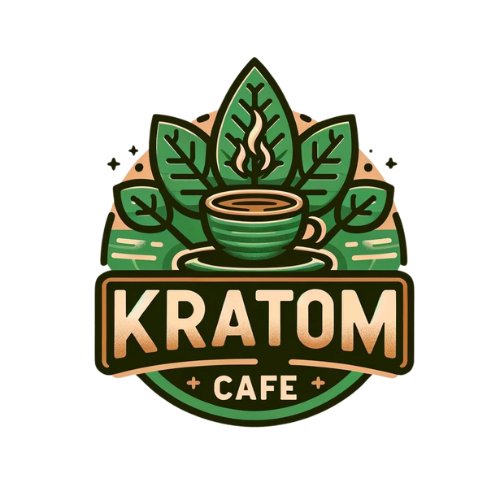Kratom supplements have been gaining popularity for their potential health benefits. We at Kratom Cafe are committed to providing you with accurate information.
This blog post will help you understand what kratom is, its possible benefits, and potential risks. Equip yourself with the knowledge to make an informed decision about kratom supplements.
What is Kratom?
Kratom, scientifically known as Mitragyna speciosa, is a tropical tree native to Southeast Asia, primarily found in Indonesia, Malaysia, and Thailand. The leaves of this tree contain compounds that can offer psychotropic effects. The main active ingredients in kratom are mitragynine and 7-hydroxymitragynine, which interact with opioid receptors in the brain, causing effects similar to those of opioids.
Common Types of Kratom Strains
There are several strains of kratom, each named based on the region where they are grown and their distinct properties. The three most common types are:
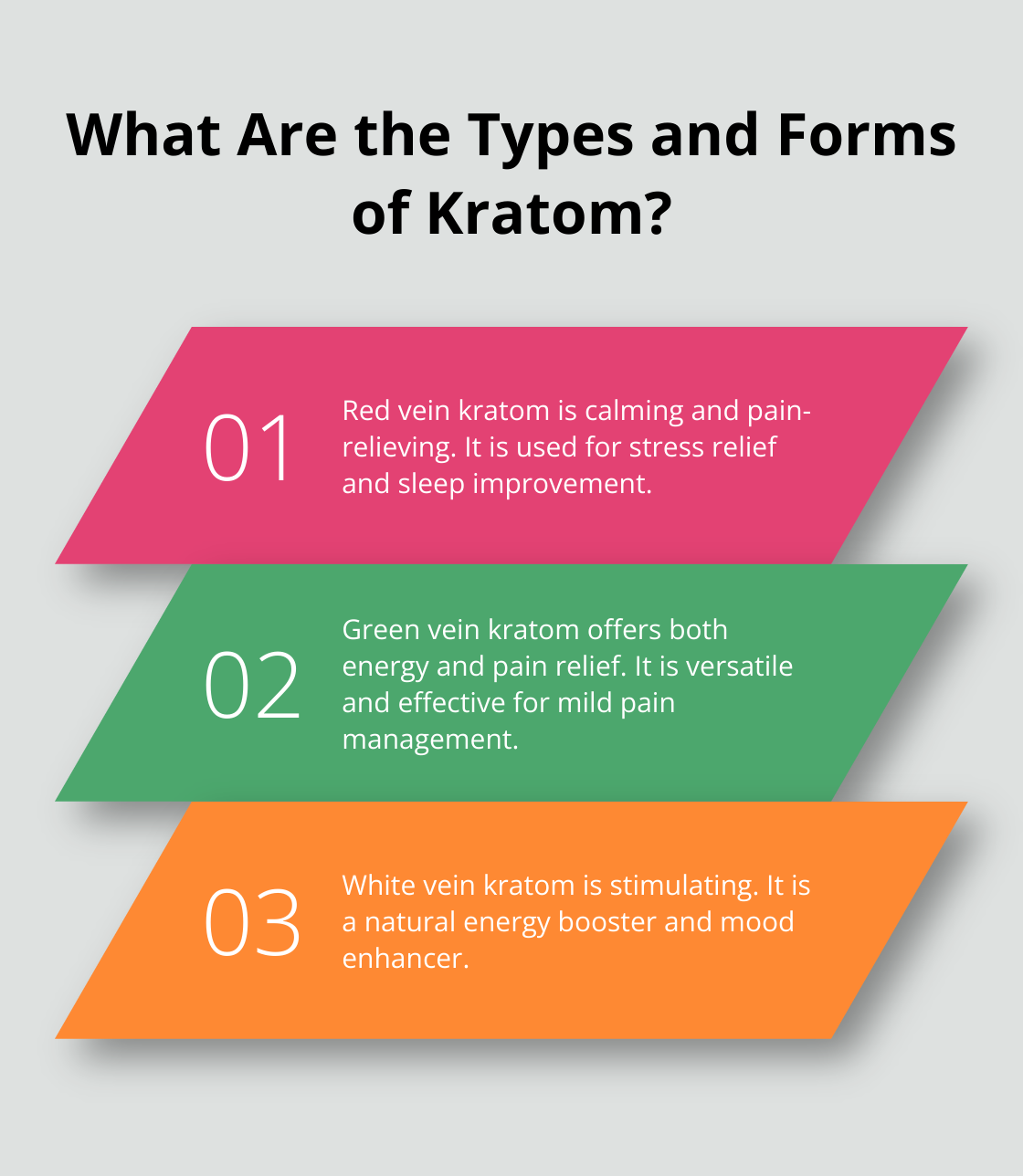
-
Red Vein Kratom: Known for its calming and pain-relieving properties, red vein kratom is popular among users seeking relief from chronic pain or stress. Data suggests red vein strains are often used for relaxation and sleep improvement.
-
Green Vein Kratom: This strain has a balanced profile, offering both energy and pain relief. Users often report its effectiveness for mild pain management and increased focus. Surveys indicate that green vein kratom is the most versatile among strains.
-
White Vein Kratom: Known for its stimulating effects, white vein kratom is often used as a natural energy booster and mood enhancer. It’s frequently chosen by users looking for an alternative to caffeine without the jittery side effects.
Forms of Kratom Supplements
Kratom supplements come in various forms, each with its own set of advantages and disadvantages. Understanding these forms can help you make an informed decision about which one might be best for you.
Kratom Powder
Kratom powder is made from dried and ground kratom leaves. It is one of the most common forms available and allows for versatility in usage. You can measure out the exact dose you need and mix it with beverages or food. However, it has a very bitter taste, which some users find difficult to tolerate.
Kratom Capsules
Capsules offer a convenient and tasteless alternative to kratom powder. Each capsule contains a specific dose of kratom, making it easier to manage and track your intake. They are also portable, making them a practical choice for those who need to take their supplements on the go. Due to their convenience, capsules are increasingly favored among new users.
Kratom Extracts
Kratom extracts are concentrated forms of kratom, created by boiling kratom powder or leaves to extract the alkaloids. This form is potent and requires smaller doses, but it also increases the risk of side effects and dependency if not used carefully. Extracts are suitable for experienced users who are familiar with kratom and its effects.
For more detailed information on kratom forms, visit different forms of kratom.
Understanding these aspects of kratom can help you choose the right type and form that suits your needs and lifestyle.
Health Benefits of Kratom
Pain Relief and Management
Kratom supplements have gained attention for their potential to relieve pain. The active compounds in kratom, mitragynine and 7-hydroxymitragynine, interact with opioid receptors, providing pain-relief effects comparable to some prescription opioids. A 2017 survey by the American Kratom Association found that 51% of respondents used kratom primarily for pain relief. Users commonly report significant relief from conditions like chronic back pain or arthritis.
Enhancing Energy and Focus
Certain strains of kratom, such as white vein kratom, are known for their energizing properties. These strains can provide a natural boost without the jitteriness associated with caffeine. According to a study published in the journal Drug and Alcohol Dependence, low doses of kratom can have stimulating effects, promoting better focus and increased stamina. This makes it a popular choice for individuals looking to enhance productivity or combat fatigue.
Reducing Anxiety and Depression
Kratom has been noted for its potential to alleviate symptoms of anxiety and depression. The mood-enhancing properties of green and red vein kratom strains are frequently cited by users who seek emotional balance and mental well-being. Research published in the journal Neuropharmacology has explored kratom’s interaction with the brain’s serotonin receptors, which may partly explain its antidepressant effects. Moreover, a survey conducted by Pain News Network indicated that 66% of kratom users found it helpful for managing depression and anxiety.
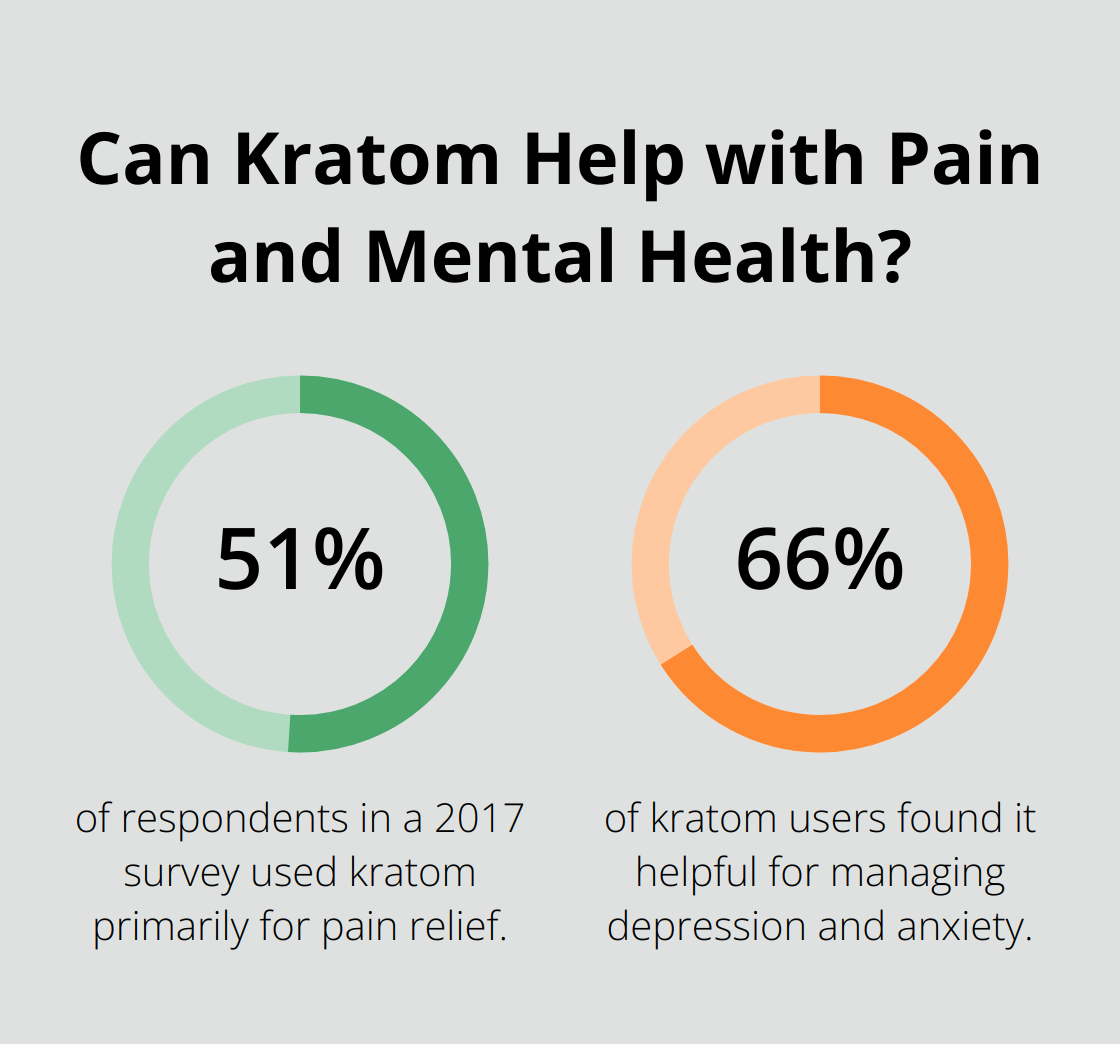
While these benefits are reported anecdotally and supported by preliminary studies, it is important to approach kratom cautiously and consult with a healthcare provider for personalized advice. For those interested in learning more about kratom’s effects, you can read about the different strains of kratom.
Understanding these benefits allows you to consider if kratom supplements align with your health needs effectively.
Are There Risks with Kratom Use?
While kratom supplements offer various potential benefits, understanding the associated risks is crucial for safe use. Here, we’ll navigate through common side effects, long-term use concerns, and kratom’s interaction with medications.
Common Side Effects
Kratom use can lead to several side effects, especially when consumed in higher doses. Commonly reported issues include nausea, dizziness, dry mouth, and constipation. According to a 2019 survey by the International Journal of Drug Policy, 32% of users experienced nausea, indicating it’s a frequent complaint. These side effects can often be managed by adjusting the dosage or taking breaks between uses.
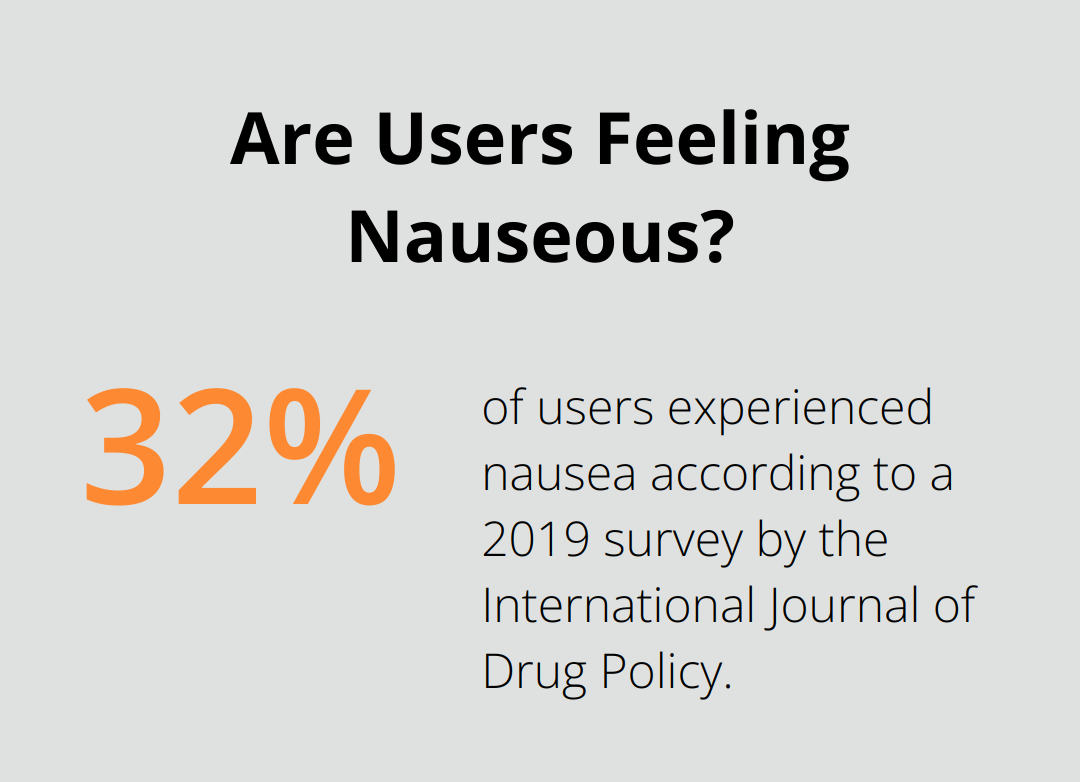
Some users might experience more severe side effects such as hallucinations, sweating, or heart palpitations. These symptoms, though less common, necessitate immediate medical attention. It’s important to start with a low dose to gauge your body’s reaction and escalate only when necessary.
Long-term Use Concerns
Long-term use of kratom presents its own set of challenges. One major concern is the risk of dependence. Mitragynine and 7-hydroxymitragynine, the active compounds in kratom, interact with opioid receptors, which can trigger dependence in some users. A study by the National Institute on Drug Abuse highlights that dependence can lead to withdrawal symptoms like irritability, muscle pain, and insomnia.
Regular use may also have an impact on liver health. Reports in the journal Clinical and Experimental Hepatology indicate cases of liver toxicity linked to kratom consumption. Symptoms of liver issues include jaundice, itching, and abdominal pain. Regular monitoring through liver function tests can help detect any early signs of damage.
Interaction with Medications
Kratom’s interaction with other medications is another area of concern. Combining kratom with sedatives, antidepressants, or other substances can lead to dangerous outcomes. For instance, mixing kratom with alcohol or benzodiazepines increases the risk of respiratory depression, which can be fatal.
It’s also essential to consider kratom’s interaction with medications metabolized by liver enzymes such as CYP3A4, CYP2D6, and CYP1A2. Research suggests this interaction can either enhance or diminish the effects of the medications, leading to potential health risks. Consult with a healthcare provider before combining kratom with any prescription drugs to avoid adverse effects.
Being aware of these risks can guide better decision-making. Always prioritize consulting healthcare providers to tailor kratom use safely to your health profile. Further insights can be gained from resources like FDA actions on kratom.
Given these potential side effects and interactions, it’s clear that kratom should be used responsibly and with appropriate medical guidance. Taking these considerations into account is vital for minimizing risks.
Conclusion
Kratom supplements hold promise for various benefits, such as pain relief, enhanced energy, and mood improvement. However, they are not without risks. The potential side effects, dependency issues, and interactions with other medications highlight the need for caution.
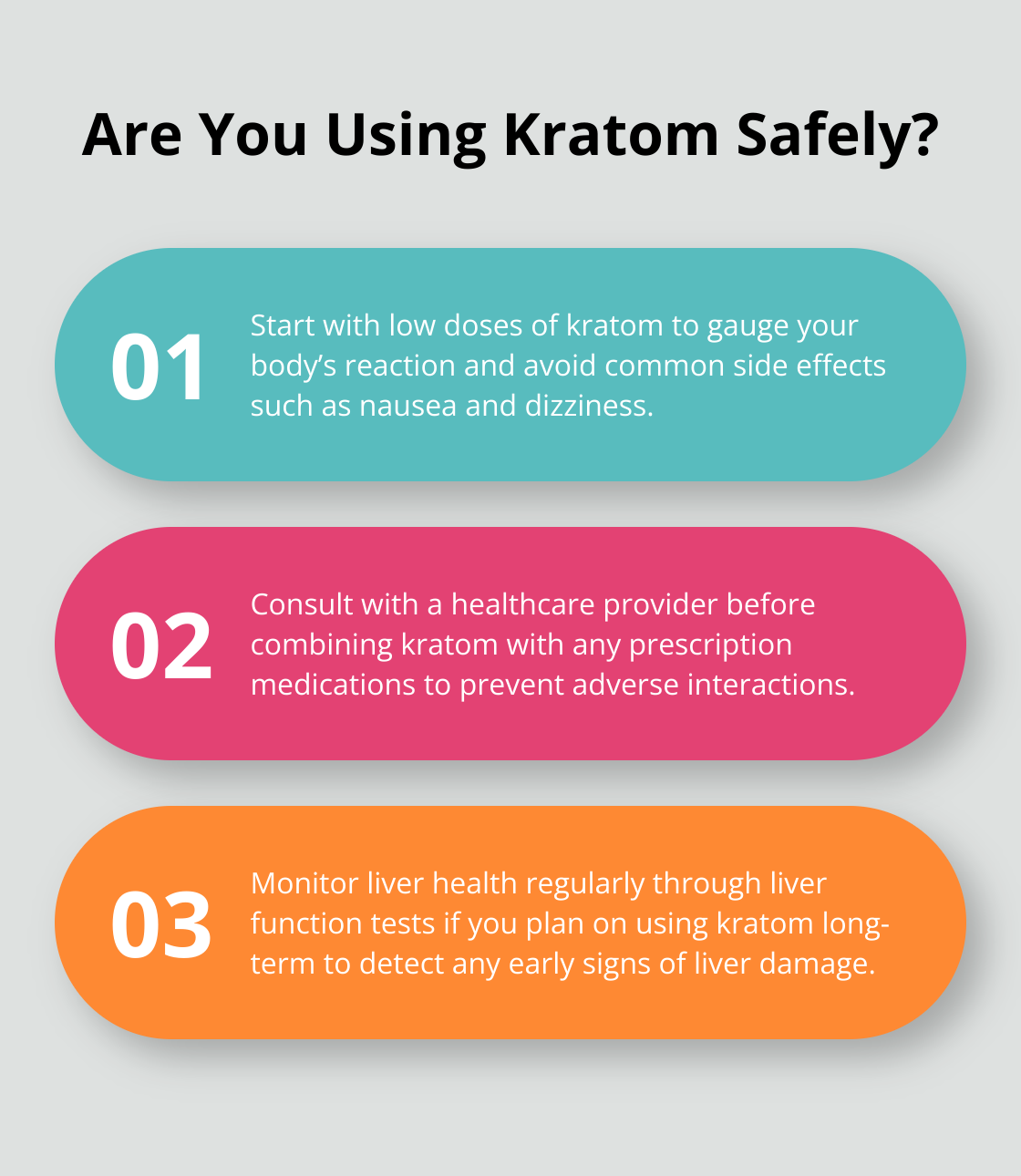
When considering kratom, it is vital to balance its benefits with the potential risks. Pain management, energy boosts, and anxiety reduction are attractive advantages, yet the side effects and long-term health concerns cannot be ignored. Before using kratom, consulting with a healthcare provider is essential to tailor its use safely to your specific needs.
For accurate and comprehensive information about kratom, visit Kratom Cafe. We at Kratom Cafe are dedicated to providing up-to-date information, scientific studies, and user experiences, helping you navigate the complexities of kratom use. Whether you’re new to kratom or a regular user, our platform offers valuable insights for making well-informed decisions.
